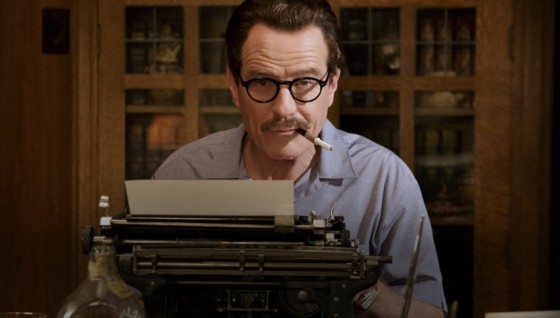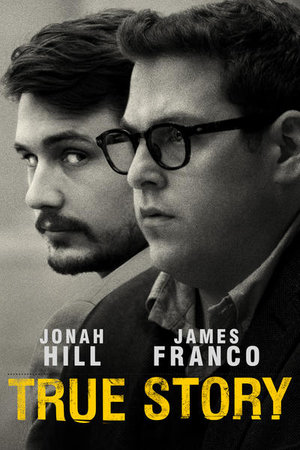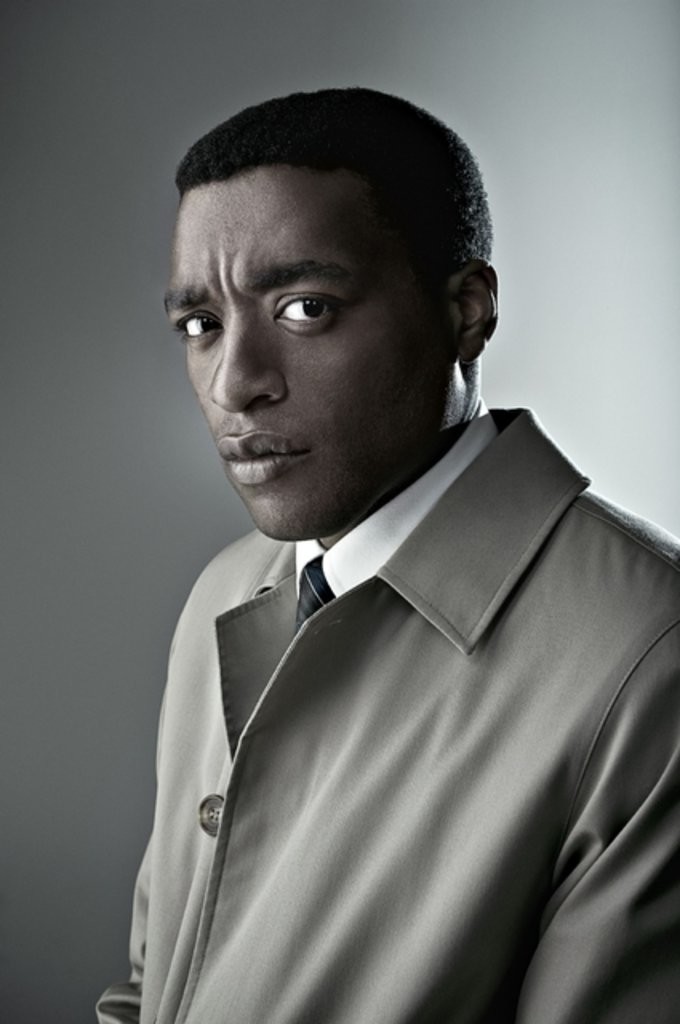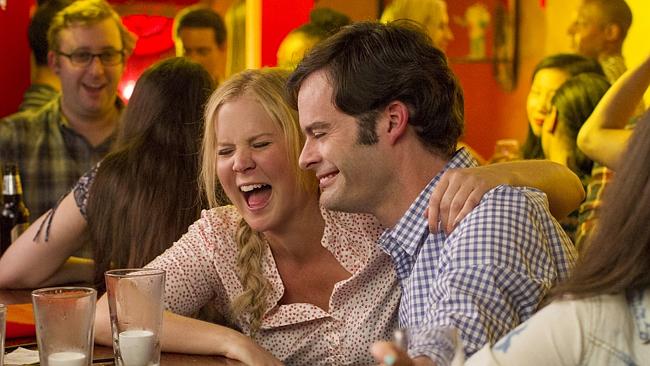Today’s script asks the question we’ve all been wondering since we took up this craft – “Is it possible to write a good movie about a screenwriter?”
Genre: Biopic
Premise: The real life story of Dalton Trumbo, one of the greatest screenwriters of all time, who was blacklisted from the entertainment industry during the 40s and 50s for openly embracing communism.
About: Starring Breaking Bad star Bryan Cranston, Dalton Trumbo is one of the big Oscar hopefuls this winter season. Writer John McNamara is a longtime TV scripter, who’s written for series as varied as Lois & Clark and The Fugitive. I was actually excited to read Trumbo when I first heard about it. That was until I read Aquarius a few months ago, the awful David Duchovny show which McNamara wrote. How did we go from that piece of garbage to a potential Oscar contending screenplay? I’m just as interested in the answer as you are!
Writer: John McNamara
Details: 118 pages
So I’m thinking every writer should attempt to write a biopic at least once, and here’s why. When you write a biopic, it’s rarely about plot. The script is powered by character, specifically the character you choose to make your subject.
Because you don’t have the cozy confines of plot to power your story (the dinosaurs have gotten loose!), you have to find ways to entertain your audience through character, and what better way to learn about writing great characters than by making them the sole engine of your story’s entertainment?
We realize pretty early why Dalton Trumbo is a great character. The man speaks his mind! And he speaks it from the unpopular side of the argument. You may not create the most likable character this way, but dammit if you won’t create a memorable character.
It may sound weird to compare an Oscar contending screenplay to the pit that is reality television, but the entire reality TV industry is based on this approach: Find people who speak their minds. People who speak their minds are universally interesting. Why do you think Donald Trump is so popular right now?
“Dalton Trumbo” introduces us to its title character not long after those dang Nazis have been taken care of. The man is the biggest and baddest screenwriter on the block. Heck, he’s so rich he’s building a lake next to his mansion.
While Dalton celebrates his riches with his wife, Cleo, as well as his growing family, a new fear is sweeping the land – COMMUNISM. The Russians have taken the place of the Nazis as America’s enemy, and Dalton Trumbo doesn’t think that’s right.
I mean, Communism basically stands for everyone being taken care of. That’s in stark contrast to a place like America, where if you live on the street, the most help you’ll get is someone screaming, “Get a job” as they splash a puddle of dirty water over you from their passing car. Not exactly the kindest ideology.
So when the U.S. creates something called the House of UnAmerican Activities Committee (worst committee name ever??) to hunt down communists in Hollywood, Dalton becomes the face of the resistance.
What starts out as a giant joke (Trumbo yukking it up when called in to testify for Congress), quickly gets serious, as the most vocal offenders start losing jobs in Hollywood. Trumbo stays defiant though, pointing out how ridiculous this all is. Until he’s sent to prison for his beliefs.
Trumbo gets out a year later to a different world. If you even THINK the word “communism,” the entertainment industry will turn you into the real-life version of an end credit. It was the only time in Hollywood history where someone could say, “You’ll never work in this town again,” and it actually be true.
But the always defiant Trumbo went underground and started writing movies for other writers who COULD get movies made, then taking half the paycheck. In fact, Trumbo wrote one of the biggest movies of all time, Roman Holiday, this way, only getting proper screenwriting credit 60 years later. On a side note, that must’ve been one hell of a WGA arbitration.
Eventually, Trumbo scraped together his band of merry blacklisted rejects and started writing for the “Roger Corman” outfit of the time, King Brothers Pictures. Some of the greatest screenwriters ever were writing moves about insect aliens and Bigfoot.
This led to Trumbo hitting a creative low-point, which drove him to write a little movie about a boy and his bull called, “The Brave One.” The film went on to win an Oscar for Trumbo under the name, “Robert Rich.” This led to Kirk Douglas calling Trumbo and asking him to write a little movie he was working on called “Spartacus.”
Despite Congress and many in Hollywood trying to strong-arm Douglas into getting Trumbo’s name off the film, newly elected president, John F. Kennedy, famously went to see the movie at its premiere, effectively ending the Blacklisting witch-hunt.
Well call me biased since this is about a screenwriter but… HOLY SHIT WAS THIS GOOD! I mean, McNamara succeeded in the first rule about writing about writing, which is to not show any writing! The Brave One, for example, is written in less than a page here. And I’m not sure we see any writing on Spartacus at all.
Dalton Trumbo wisely keeps the focus on ACTION. And I don’t mean Michael Bay action. I mean keeping the main character ACTIVE. Trumbo is always going after something here, always stirring shit up. And that’s what keeps this screenplay, which is essentially a bunch of talking heads, trucking along.
Like I said at the beginning of the review, you start with character in your biopic. You gotta give us a lead who’s exciting to us. And Trumbo achieves this because he takes on the establishment. When you take on anything bigger than you, you’re going to receive a lot of shit back, and that’s where drama lives, in the space between pushing and getting pushed back.
And McNamara doesn’t stop at making Trumbo a shit-stirrer. He makes him a hypocrite too. Note to writers: Characters who are hypocrites always illicit a reaction. So they’re a good character trait to add.
Trumbo is this extreme liberal who’s all about standing up for the little guy – giving the poor man on the street a hearty meal and a place to sleep. And yet he hoards his millions and enjoys the perks of living in the biggest house on the block (and building fucking lakes next to that house!).
I thought it was quite interesting that Trumbo’s hardships never got that bad. Even when he’s at his “lowest point” he only has to move into a “semi-mansion.”
You may think that all you need to do with a character like this is sit back and let him entertain. But you still have to build a plot into your story. And with biopics, that plot must be nuanced. Remember, your main character has to remain the star of the film. If the plot is too big and starts bullying your hero around, the screenplay loses its punch.
So McNamara adds some big – just not “too big” – goals for Trumbo to go after. At first, it’s to stand up for the first amendment. Trumbo knows his opinion about communism isn’t popular, but he’s fighting for the very American right to have that opinion. And the conflict he encounters through this battle drives the first half of the screenplay, culminating in the prison sentence.
The second half of the screenplay, when he leaves the prison, then becomes an underdog story. Now that Trumbo has fallen and nobody wants to touch him (even his best friend has publicly shamed him), Trumbo’s goal is to thrive inside a system that refuses to let him write.
The irony of Trumbo writing monster flicks eventually leads to one of his screenplays winning an Oscar, which reignites the debate of whether blacklisting is necessary. Having one of the biggest stars in town then ask him to write his next movie is the final nail in the blacklist coffin.
“Dalton Trumbo” is also peppered with these brilliant little additions, such as making American icon John Wayne the villain of the film! Wayne, who’s clearly playing the role of a 2015 Clint Eastwood, is the biggest supporter of the flag-waving blacklist movement, and the battle between this little screenwriter and this giant movie star is one of the script’s highlights.
There’s not much to fault “Dalton Trumbo” for. I suppose its biggest weakness is its subject matter (trying to get people to watch a movie about a screenwriter in the 1950s – I wouldn’t want to be on that marketing team – Movie Trailer Voice: “This holiday season, one man uses his pen to change a nation.”). But if Bryan Cranston can pull off even half of how Trumbo’s written on the page, this should definitely be Oscar-worthy.
[ ] what the hell did I just read?
[ ] wasn’t for me
[ ] worth the read
[x] impressive
[ ] genius
What I learned: In every screenplay you write, either your main character needs to be making something happen, or something needs to be happening to him. In many cases, both of these things will be happening at the same time. If you open to any page in “Dalton Trumbo,” you’ll see this. So in the first act, the government comes after Dalton (something is happening to him). So Dalton then takes on the government (he’s making something happen). The government later throws him in prison (something is happening to him). Afterwards, Dalton keeps writing despite Hollywood trying to stop him (he’s making something happen). If you ever reach a point in your script where your main character isn’t making something happen and you’re not using exterior forces to make something happen to him, your script will be at a standstill. It will feel like nothing is happening. So make sure you’re always doing one of these two things!
Genre: TV Pilot – Drama/Thriller
Premise: A new crop of potential FBI agents are recruited to the Quantico training grounds, where they’ll be put to the test in the hopes of becoming members of the prestigious force.
About: Creator Joshua Safran is an NYU Tisch grad who was an executive producer and writer on the hit show, Gossip Girl. Pitched to buyers as “Grey’s Anatomy meets Homeland,” it wasn’t long before the Shonda Rhimes network – err, I mean, ABC – bit and bought the series. I’ve heard mixed things about the pilot but, without a doubt, Quantico has become one of the big TV show bets for the fall season.
Writer: Joshua Safran
Details: 57 pages
For those who don’t know anything about screenwriting, or for those who are just getting into it, there’s this pervasive thought out there that writing comes down to opinion. Like, some people may like something, other people may not like something, but it’s all in the eyes of the beholder.
They don’t realize that there’s actually a skill set involved in writing – that whether you’re interested in a particular subject matter or not, there are indicators that make it clear some writing is better than other writing. Comparing today’s pilot, Quantico, to yesterday’s screenplay, The Pier, reminded me of that.
The skill set of today’s writer, Joshua Safran, is just so much higher than yesterday’s skill set, it’s ridiculous. And I’ll get into more detail about that in a moment. But first, let’s discuss what Quantico’s about.
Quantico introduces us to 25 year-old Alex Weaver. Alex is sexy but guarded, the kind of girl who will sleep with a man on the down low to get her rocks off, then never talk to him again, because God forbid she actually connect with someone.
On the way to Quantico, the FBI training grounds, Alex does just that, sleeping with a man she meets on the plane named Ryan Booth. After ditching the sucker, she later finds out that she was the sucker. Turns out Ryan is also an aspiring FBI agent. Joke’s on you Alex.
We also meet a wide array of fellow potential students at Quantico. There’s gay Brooklyn hipster, Simon Asher, Midwest Muslim feminist, Nimah Anwar, Utah Mormon, Eric Packer, modern Sourthern belle, Shelby Wyatt, cocksure golden boy, Caleb Haas, as well as a few others.
The group is led by 56 year-old Liam O’Connor, who, like a lot of people here, isn’t entirely who he seems. In fact, we meet the guy trying to kill himself. Now he’s in charge of these rascals.
Quantico gets interesting when, during the training, we start flashing forward nine months, where we learn that a giant bomb has taken down Grand Central Station in New York. Alex happened to be on location when it happened, and is getting grilled by local task forces, who have told her the unthinkable: they believe one of her classmates at Quantico did this.
So we jump back and forth between the training and Alex getting interrogated as to what she knows. As the pilot goes on, we realize that they believe Alex is the terrorist. Which means that Alex will have to utilize everything she learned at the Academy to get the hell out of this mess, and figure out who the real terrorist is.
So at the opening of this review, I said there was a clear difference in skill sets between today’s script and yesterday’s, The Pier. Let me explain what I mean.
For starters, “The Pier” was extremely predictable. Now every story is unique. Some stories are meant to be told in offbeat ways and others straight-forward ways. You need to factor that into any analysis. But it’s always your job, as the writer, to anticipate what the audience is expecting, and play against that to some extent.
The problem with The Pier was that everything I expected to happen was exactly what happened. I mean, I knew on page 10 that on page 60 I’d be in some dark room on that pier with some creature spooking our characters out somehow.
Quantico wasn’t like that. I expected this to be very “Grey’s Anatomy,” where we simply meet a bunch of trainees, they get into a lot of sexy conflict for 60 minutes, a cliché cliffhanger arrives on the last page (one of the characters goes back to his room, closes the door, and calls someone on a secret phone and simply says, “Yeah, I’m in.”) then “The End.”
I was not expecting the flash-forward to the terrorist attack. Not only was that a surprise, but it added a nice “parallel storyline” structure to the pilot that gave it some depth.
Another area where you can really determine skill level in screenwriting is in how the writer disseminates exposition and backstory. Yesterday’s script did an okay job of this. They needed to explain the history of the pier and they did so with a rather standard but “got the job done” scene at the local museum where a guide uses a museum artifact taken from the pier as a jumping-off point to explain the pier’s history to a group of schoolchildren. Not terrible, but we’ve seen that scene a billion times before.
In Quantico, you don’t even realize you’re being handed backstory. Which is kind of shocking since there’s a ton of backstory here. How do they do this? They wrap the backstory in a series of scenes where conflict and drama take precedence. This way we’re more engaged in the drama than we are focused on the backstory.
The FBI trainees are told that their first test is to look through a fellow trainees’ profile. One major part of their profile has been deliberately omitted. It’s their job to find out what that missing piece of info is by any means necessary, then interrogate the trainee and get them to admit to it.
In all of these cases, what’s missing is something the trainees don’t want divulged. So these interrogations play out as these intense showdowns, a dance of pushing and pulling until one of the trainees finally breaks.
Of course, we’re so taken by the drama, by the characters trying to outsmart one another, that we don’t realize these scenes are 100% backstory injectors!!! They’re used to allow our characters to ask key questions about the trainees backstories so that the reader can get to know the characters better. In short, by wrapping backstory inside of drama, you display a much higher skill set than the average screenwriter.
Finally, good writers give us endings we didn’t see coming. This is one of the hardest things to do in screenwriting because everything in your story tends to point to one clear finish line. To then spin that to give us something we weren’t expecting requires some mad skill.
Where did The Pier end up yesterday? I’ll give you a hint. Our group of characters escaped the pier. Quantico ended up in the LAST place I expected it to. Again, I thought this was going to be some hot young actor feeder pilot that would keep our group of studs and super models in the friendly confines of Quantico while they trained to make agent for the next 2 years.
But Quantico ends (spoiler) with Alex escaping in the 9-months-forward timeline and becoming a fucking fugitive. What the hell??? Now maybe that becomes our “forward” timeline and, in future episodes, we still follow the “past” timeline where we watch our trainees try to make agent back at Quantico, but either way, this is not what I was expecting.
For all these reasons, Quantico is a great script to study if you’re interested in writing for TV. I’m not going to say it’s perfect. In fact, I’ve heard a lot of people complaining about the trailer being too focused on how sexy the cast is (I’m too afraid to watch the trailer for this reason – I hate how easy it is to screw up a pilot with bad direction), but as far as the script goes, it’s really good. I’m sure there are a few people in the comments section who can help you find it if you can’t seem to locate it yourself.
[ ] what the hell did I just read?
[ ] wasn’t for me
[xx] worth the read
[ ] impressive
[ ] genius
What I learned: Set up your characters AND tell a story with your pilot. A lot of pilots I read focus exclusively on setting up the characters. Especially in these “Grey’s Anatomy” type shows, where we’re being asked to meet an entire group of people working at a new location. On the flip side, I’ll also read a lot of “Lost” like pilots that are only interested in plot. They feel more like movies than TV shows as a result. Ideally, you want your TV pilot to do both. That’s why I liked Quantico so much. One half of its storyline is dedicated to introducing us to this large cast of characters. The other half gives us the plot-friendly terrorist attack to worry about. And not only that, it weaves these two halves together. The future plot requires our main character to figure out which one of the people she trained with is the terrorist. That’s good writing!
Genre: Adventure/Fantasy
Premise: When a construction worker goes missing during the restoration of an old pier, a group of kids go searching for him, only to find out that the pier is haunted by evil mermaids.
About: “The Pier” finished in the runner-up spot on last year’s “Brit List,” the list of the best unproduced scripts written by British writers. While the Brit List hasn’t exactly lit the world on fire in recent years, Hollywood definitely took notice this time. Writer Jay Basu was courted to adapt one of the biggest video games of all time, Metal Gear Solid, and was also brought in by Universal Pictures to join its “Monsters Universe” team, the studio’s attempt to create a universe out of its famous monster franchises (the Mummy, the Wolfman, etc.). Finally, Basu was able to get credit on the sequel to now mega-director’s, Gareth Edwards, breakout indie film, “Monsters,” which is titled “Monsters: Dark Continent.” That film can now be found on Netflix.
Writers: Jay Basu (current revisions by David Bowers)
Details: 105 pages (June 2013 draft)
For every Jurassic World, there is a Pixels, a movie Sony was betting big on this summer but was barely able to scrape 24 million out of this weekend. This marks Sony’s ONLY big release this season, so the fact that it bombed worse than Jr. Pac-Man is devastating for a studio that has clearly lost touch with the public. I guess they have new people running the show now but if they’re not careful, they’re going to end up like United Artists.
Speaking of summer blockbusters, may I remind you of the man who invented the summer blockbuster? A certain bearded gentleman named Steven Spielberg? I don’t think today’s generation realizes just how much Spielberg changed the game. Before him, everyone wanted to make dark moody three hour thought-bombs. Spielberg wanted to make candy-bombs. And it completely changed the way we went to the movies.
Jay Basu is clearly channeling his inner-Spielberg with “The Pier.” This script has the big idea, the sense of wonder, the childlike curiosity – all the things that make a Spielberg movie a Spielberg movie. But is it any good? That’s the real question. A question that can only be answered with a Scriptshadow review!
We’re in a small seaside town known as Wharton Bay. At one point, this town was THE destination for the vacationing summer family. It had one of those super-piers, with restaurants and roller coasters – it even had a ballroom!
But an accident crippled the pier, leaving it unsafe, and ever since, it’s grown old and dusty. That is until Jake and Annie Campbell moved into town. Jake has raised just enough money to revive the pier with the plan of bringing it back to its former glory.
Unfortunately, just as major progress is being made, one of the workers disappears. This leads to an investigation that threatens to close down the entire operation. Which is where our hero, 12 year-old Ash, comes in. Partially deaf, Ash is Jake and Annie’s son. He realizes that if he doesn’t figure out what happened to this man, his family will have to go back to the big city, where everyone made fun of him.
So Ash teams up with his weirdo friend, Bones, his brand-new crush, Emma, and his older brother Liam and Liam’s girlfriend Natalie. The five head to the Pier, only to realize that the damn thing is haunted. As they sneak in and out of the various abandoned buildings, they realize the place is being watched over by… yup… evil mermaids who want to eat your soul!
The five must fight for their lives as they figure out a way back to shore. But the longer they stave off these deep sea demons, the more they realize that there’s something else going on here. Maybe these mermaids aren’t trying to kill them after all. Maybe this is just a big wet cry for help.
This was a perplexing one. If The Pier was up for a slot on Amateur Offerings, I’m pretty sure it wouldn’t win the weekend. I’m struggling to figure out why this got so much attention and I’m stuck between the fact that the Brit List isn’t very competitive, and I’m not as appreciative of family fare as maybe the industry is.
Either way, let’s start with the positives. This is a “mass-entertainment” concept. It’s the kind of idea that studios like because it appeals to that young demo that’s the least discerning and it snags that PG rating, which allows the most amount of people to see your movie.
Second, it takes a familiar premise and approaches it in a new setting. Obviously, The Pier is aiming to be The Goonies and it substitutes a pier for caves.
Third, we have a new type of monster. Basu flips the script here and takes what is traditionally thought of as a “good” creature, and turns him/her bad. That was kind of inventive and contributes to the coveted “same but different” sweet-spot Hollywood’s always aiming for.
I think I sometimes glaze over these things because they seem like the easiest part of writing to me. But then I remember how many bad and boring concepts I come across. The majority of writers out there don’t know or don’t care what the masses want to see.
If there’s one thing you have to give “The Pier,” it’s that it FEELS LIKE A MOVIE. By that I mean, you can put it on a poster, you can create a great trailer. There’s action, adventure, excitement, scares. These are all MOVIE-LIKE things. Contrast that with, say, Jonah Hill and James Franco’s, “True Story.”
These are two of the bigger movie stars in the world. But look at this poster. Do you know what this movie is about? Do you see this poster and want to watch this movie? Does this even look like a movie to you?? That’s what I mean with “The Pier” when I say it FEELS like a movie.
But when you go into the actual execution of “The Pier,” it’s kind of baffling that this script garnered any attention. Every aspect of the script is extremely basic. You always know what’s coming 20 pages before it’s written because the writers aren’t interested in pushing the story in any unique or unexpected directions.
So you know we’re going into some dark room and we’re going to see a scary mermaid in the corner. You know in the next sequence we’re going to go into a carnival room of mirrors and we’re going to see a scary mermaid in a mirror. That’s the whole movie really. We just go from location to location on the pier and see scary mermaids.
And I suppose you can argue: “Well that’s every monster movie, Carson.” Isn’t that every episode of The Walking Dead? I guess, yes. But here’s the difference. Scripts can survive ONE element of basic or subpar execution. They can’t survive MULTIPLE subpar elements.
And that’s the thing. With, “The Pier,” the characters were very basic (less inventive versions of the Goonies characters). The plotting was very basic. The humor was very basic. The dialogue was very basic.
For example, here’s a line from Liam, the cool older brother, when he’s told they’re going to check out the man’s disappearance: “Like C.S.I. Wharton Bay? But instead of actual police it’s three dopey kids?”
What cool 16 year-old boy uses the word “dopey?” “Dopey” is a word a 45 year-old man uses.
Or here’s a representation of the humor in the script. Towards the end, when time’s running out, Ash says: “And if we don’t do something now, our story will always be about how five kids went missing out on Mermaid pier.” Liam quickly responds: “Three kids, two young adults.”
I’m not saying that’s a terrible joke. But it’s just so… plain. And that was my issue here. Everything was too plain. I’d imagine, if they were going to make this, that they’d bring in a big time writer to really elevate all of these choices, from the characters to the scares to the plotting to the dialogue. It’s way too reserved and safe, even more so than a script like Pixels, which only was allowed to slip through development because Sandler gets final say on the script and the man doesn’t give a single shit about quality.
And I think that’s the real issue here. When I read a script and I don’t feel like the writer TRIED HIS HARDEST – that’s something that I can’t get past. I KNOW there’s a better joke out there than, “3 kids, 2 young adults.” You can’t not know that. And if you’re not striving for the best you have to offer, why are you in the game?
Basu and Bowers should definitely be congratulated for coming up with an idea that captured Hollywood’s attention. It’s harder to do than you think. But I’m really surprised this script made as much of an impression as it did with its way-too-standard execution.
[ ] what the hell did I just read?
[x] wasn’t for me
[ ] worth the read
[ ] impressive
[ ] genius
What I learned: Do a “Joke Pass” on every script you write. That means go through every single one of the jokes in your script and try to come up with a better joke. Even for the jokes you think are your best. I guarantee you’ll elevate half of the jokes in your script.
What I learned 2: Actually, you should be doing passes for every major element of your screenplay. You should do a character pass, a dialogue pass, a theme pass. By doing a pass where you focus on one specific thing (and not try to fix everything), you have a much better chance of keying in on what’s wrong/missing with that thing and fixing it.
Get Your Script Reviewed On Scriptshadow!: To submit your script for an Amateur Review, send in a PDF of your script, along with the title, genre, logline, and finally, something interesting about yourself and/or your script that you’d like us to post along with the script if reviewed. Use my submission address please: Carsonreeves3@gmail.com. Remember that your script will be posted. If you’re nervous about the effects of a bad review, feel free to use an alias name and/or title. It’s a good idea to resubmit every couple of weeks so your submission stays near the top.
Genre: Biopic
Premise (from writer): A Southern black folk singer walks the line between a violent criminal life and becoming a great American musician.
Why You Should Read (from writer): Inspired by the likes of “Raging Bull” and “Thirty Two Short Films About Glenn Gould”, “Sessions of Lead Belly” is stylistic bordering on surreal and strives for quality even at expense of authenticity. — The nonlinear structure throughout different periods in Lead Belly’s life of the early 1900’s is patterned to best draw interest and convey information, exploring who Lead Belly is and why, as well as the futility of triumph and meagerness of survival against all odds. — Every sequence is nearly standalone, playing out as ambitious mini-stories and innovative short films, each with a calculated build and unique style.
Writer: Cody Kerr
Details: 124 pages (this is a slightly different draft, I’m told, from the one that appeared on Amateur Offerings – Cody has reworked a few things based on your suggestions. That’s the draft I’m including in this review)
As we head into a strangely mediocre movie weekend that includes films like Pixels (quite possibly the most vanilla execution of an idea I’ve ever seen), Paper Towns (a John Greene novel that, based on the trailer, appears to change plots 17 different times) and Southpaw (Can we just be honest here and admit that the only reason these boxing movies get made is because an actor wants to show how good of shape he can get in for the role?), my question to you is, “What do you wanna see?”
No, not between these three movies. I know you don’t want to see any of those. I mean, are there movies out there you wish were being made but aren’t? What are the ideas? What are the genres? Are you like me? You know you want something different, you just won’t know what it is until you see it. I suppose that’s part of being different. Is you just don’t know what it is until it’s placed in front of you.
Well, one thing that audiences have definitely been more into lately is biopics. David O. Russell’s “Joy” trailer just debuted and while I’m pretty sure whoever cut that trailer did 11 lines of coke right beforehand (it’s a movie about a woman who makes the miracle mop that doesn’t include one mention of the actual mop), I’m sure subsequent trailers will get everyone revved up to see it, because the script was damn good.
Which brings us to today’s screenplay. Cody Kerr is hoping to capitalize on the biopic craze by introducing us to a controversial singer from the first half of the 20th century. Is “Sessions of Lead Belly” going to garner a David O. Russell like visionary to attach himself and make it the next big biohit? Let’s find out!
At various points between the 1910s and 1940s, we follow a man named Lead Belly, a black musician who likes to sing about a variety of things like slavery, shipwrecks, and Hitler. In the 1920s, Lead Belly suspects his wife’s cousin is sleeping with her, so he shoots and kills him.
Once in prison, Lead Belly becomes extremely popular as he loves to perform for the other prisoners and the prison staff. This ends up getting him out of prison after only 7 years of a 35 year sentence. Once out, Lead Belly struggles with a drinking problem, and strives to shed his “murderer” image in an attempt to be taken seriously.
But problems seem to follow the man wherever he goes and, I believe (to be completely honest, it was hard to understand what was going on a lot of the time here), he killed a second man and had to serve a sentence at another prison. But Lead Belly kept fighting, getting out of prison again, and ended up making some of the best music ever recorded by man.
Something we don’t talk about a whole lot here on the site is CRAFT. Craft is the ability to put a clear story together within the unique constraints of the screenplay format. While reading Lead Belly, I could see how much love and emotion was infused into the story. But what I didn’t see was craft – the ability to take that emotion and make sense of it. There’s too much going on here. There’s too much jumping to different years for no reason. There are basic clarity mistakes being made in almost every scene.
I felt like a detective wading through this script. I had to piece together clues just to keep up with basic story points. For example, there’s this guy named “Huddie” in the script. Then there’s this guy named “Lead Belly” in the script. Well, low and behold, at around the mid-point, I found out they were the same people!!
That’s really basic clarity stuff that you don’t want to mess up on. Just use one name the whole time. And if you absolutely have to change the name in the script (which sometimes happens), fucking throw a fireworks party worth of attention at it. “JOE IS NOW FRANK!!!” (that’s a slight exaggeration – don’t use exclamation points – but do make it damn clear).
And to get into this a little deeper, consider how this issue plays out on the reader’s end. Sessions of Lead Belly jumps all over the place in time. It’s 1942, 1917, 1930, 1938, 1918. We’re already struggling to keep up with all this jumping around. Then on top of that you change the main character’s name on us? So in some sections he’s one name and in others he’s another? I almost want to ask: Are you purposefully trying to confuse us??
Actually, this kind of thing happens a lot with new writers. They want to be different. They want to be edgy. They want to fix the very issue I brought up at the beginning of this review. They want to make something different that people haven’t seen before.
But they don’t understand the craft yet so they don’t know how to pull of this edgy approach. When you’re jumping through time a lot, one of your jobs is to become something I call: a grandmaster hand-holder. You need to do a lot more hand-holding with the reader than normal, because we’re being thrown around into too many time periods and if you aren’t EXTREMELY CLEAR about where we are, we’re going to get confused and eventually check out.
And I’ll be completely honest – by page 70 I started skimming. And I rarely do that when I review a script but, damn, I was so confused and frustrated about where we were and what was going on half the time, I just didn’t have the mental capacity to keep trying to figure things out. I felt like the writer had made things way more confusing than they needed to be.
And for what purpose? What was gained by these time jumps? They seemed to be there to be there. To give the script an “artsier” feel. If I felt some purpose behind them, I might’ve been more receptive. Like the opening scene shows someone stab Lead Belly. If the rest of the movie would’ve been a lead up to that moment, I would’ve understood the purpose behind starting with that flash-forward. But we don’t get that. We’re just randomly thrown into various years and expected to keep up.
And also – and maybe this had something to do with me expending so much energy on figuring out where we were in the story – I never felt like I understood Lead Belly’s problem. What was the main thing he was dealing with in his life that he needed to fix?
Cause when you write a biopic, “what he needs to fix” is the heart of your story. Unlike regular movies which have goals for the characters to achieve, biopics are all about the main subject figuring themselves out – or at least coming to peace with who they are. It’s been forever since I saw the Johnny Cash movie with Joaquin Phoenix, but I remember in that movie, Cash couldn’t get past the fact that his father didn’t love him, didn’t approve of him. That’s what the movie kept coming back to.
I couldn’t figure out what was “wrong” with Lead Belly. And, actually, because the script was laid out in such a confusing way, I had to go to Lead Belly’s Wikipedia page to fill in the gaps. And what I learned was that he had a really bad temper. That seems like something that could’ve been explored. Especially if that’s the reason he murdered two people. A man learning to control his inner rage and trying to become a better person – I definitely could’ve gotten on board with that.
But, again, I think Cody just needs to write a few more screenplays and get a better feel for how this craft works because, unfortunately, just feeling emotions about your character and jumping around to moments in their life – that isn’t enough. There has to be a plan and a theme (that thing your character is trying to overcome) clearly established. The destination has to be better laid out (where are we going??). And simple things shouldn’t be needlessly complicated.
And I’m going to end this review by saying this – because it continues to be the number 1 reason that amateur writers screw up their screenplays: Stop trying to be so complex. Just tell a simple story. If it’s a good story, we’ll enjoy it. I promise.
Screenplay link: Sessions of Lead Belly
[ ] what the hell did I just read?
[x] wasn’t for me
[ ] worth the read
[ ] impressive
[ ] genius
What I learned: Grand Master Hand-holding. The more complex your story is (the more time jumping, the more characters, the more subplots, the more plot points, the more plot twists), the more you’re going to need to hold the reader’s hand during the story. Never be afraid to be clear. I know some writers are scared of being too “on the nose,” but I’d much rather be sure of something important (like that a character from the 1920s with one name and a character from the 1930s with another name are actually the same person) than be left guessing.
How to avoid the “aimless riffing” issue that plagues Apatow’s newest film.
So I went to see Trainwreck last night and, holy shit was it boring! The trailer makes the movie look really good but that’s because the trailer does the one thing the film doesn’t do, which is to FOCUS THE DAMN STORY.
Judd’s biggest issue is his propensity to let scenes drag on for too long. If you saw Trainwreck, chances are, you felt the way I did – which is that the scenes never ended. While a script can survive one or two drawn-out scenes. It can’t survive a bunch of them. And it definitely can’t survive ALL the scenes being that way.
And I understand why Apatow does this. He’s very much a “workshop the scene” kind of guy. He’ll start with the scene as written, then play with it on set, allowing the actors to riff and try a bunch of jokes, the objective being to stuff as much comedy into each scene as possible.
Unfortunately, movies don’t do well with that plan. They like when everything is tight, focused, and to the point. They like when scenes feel like they have a purpose. So in honor of this terrible movie, and Apatow’s lazy approach to scene-writing, it’s time to remind ourselves what the principles of good scene-writing are.
1) Give your featured character an objective in the scene – The key character should have an objective in each scene. This is their “goal.” Play the scene out until the character either achieves or fails at this goal. As soon as one of those two things happens, the scene is over. Notice I said “key” character and not “main” character. That’s because sometimes, someone other than your main character will have the objective in the scene. For example, if your main character gets called into their boss’s office to get fired, it’s the boss’s objective that’s driving the scene (to fire your main character).
2) Get in late, get out early – Good God could Apatow have benefited from this Screenwriting 101 advice. The main reason scenes drag is that you either came into the scene too early or stayed with the scene way too late. Once you know what your key character’s objective in the scene is, try to start the scene as close to that objective as possible (unless you’re trying a specialized dramatic technique – more on that in a sec). So to use our “firing” scene again, get us in that scene right when the boss is about to fire her! Then, once that’s done, cut to the next scene! In Trainwreck, after the boss had fired Amy, we actually STUCK AROUND as two co-workers entered the scene and asked if Amy had been fired yet. It was an attempt to be funny but no one laughed because the objective had already been reached. Whether Apatow knew it or not, he had signified to the viewer that the scene was done. Now had those co-workers walked in and asked this question BEFORE the firing had happened, it might’ve worked (and that actually sounds like it would’ve been funnier). But you can’t do that after all the air has already left the balloon.
a. (Specialized Technique) – Yes, you typically want to come into a scene as late as possible. But there are some instances where a drawn-out scene opening can work. For example, if you utilized some dramatic irony and informed the audience ahead of time that Amy was getting fired (something Amy doesn’t know), now when Amy walks into her boss’s office, you can introduce a few pages of conversation before the firing happens. Why? Because you’ve added the element of anticipation. We know the bomb is going to go off, so there’s an added element of tension to the interaction. So yes, you can ignore the “get in late, leave early” rule (just like you can ignore any rule). But you should have a good reason for doing so.
3) Conflict – This, Apatow knows how to do. He knows that in every scene, there needs to be some sort of conflict driving the scene. Without conflict your characters aren’t trying to work through anything – aren’t trying to come to a conclusion on anything – which leaves the audience wondering why the scene is being included. You could feel conflict in Amy’s scenes with her first boyfriend (John Cena), who liked her more than she liked him, in the scenes with her father, who was always butting heads with Amy about her life, with her sister, who she didn’t see eye-to-eye with on anything, and with the main love interest, who she was afraid to fall for, leading to her sabotaging their interactions. Conflict is good, folks. Use it!
4) Stakes – The higher the stakes are in a scene, the better. If nothing’s on the line, the scene will feel pointless and boring. Obviously, not every scene can be of Level 100 importance. Your main characters can’t be about to break up every single time we’re with them. So you have to stagger the intensity level of the stakes. But there should always be SOMETHING on the line. I recently read an amateur script where two co-workers were kind of hungry so they went to get some pizza. On the way there, the subway train broke down, and we stayed with them for the next four pages as they tried to figure out how they were going to get their pizza. So our two characters weren’t even that hungry. They didn’t have anywhere important to be. They decided to get pizza on a whim. The train broke down, preventing them from getting their food…. Why is this scene supposed to interest us? It doesn’t. Because there’s nothing on the line. You gotta add those stakes, people.
5) Urgency – Urgency is probably the least important of all the scene tips I’m offering today, but don’t underestimate its power. If you put a timer on a scene, you can really add some life to it. Couple it with some high stakes and, baby, you’re cooking with gas. If, for example, in the aforementioned subway scene, we changed it so that our two workers were trying to make it across town for the biggest meeting of their life? If not making it to that meeting meant their company lost a 400 million dollar deal? And they only had 10 minutes left to get there? Now you have a scene that people are going to care about.
6) Necessity – Finally, make sure the scene you’re writing is necessary in the first place. The worst scene is the one that doesn’t need to be in your movie. To know which scenes you need, know what your main character wants in the movie. What’s his goal? In Die Hard, John McClane wants to save his wife from the terrorists. So if you include a scene where John McClane goes swimming in the building’s swimming pool, that scene’s probably not going to play well, is it? That’s because it doesn’t get Johnny closer to saving his wife. Where I see this mistake the most is when the writer doesn’t know what their movie is about in the first place. Since they don’t know what their hero’s after, they can’t plan which scenes are needed to get them there.
Feel free to offer your own scene secrets in the comments section. For example, sometimes you want to “turn” a scene so that it goes in a different direction than the audience thought it would. This is really important in comedy. I was watching Modern Family the other day and uptight married couple Phil and Claire get stuck on a double-date at a nice restaurant with their hillbilly neighbors. You think you know where this is going (the hillbillies are going to cause a scene, being loud and boisterous, embarrassing Phil and Claire), but instead, the hillbillies bust out a nice bottle of wine, have a stellar rapport with the wait staff, and begin bragging about their son being accepted to Julliard.
Don’t just help your fellow writers with these tips, help Judd Apatow. The guy definitely needs to improve his scene work.












